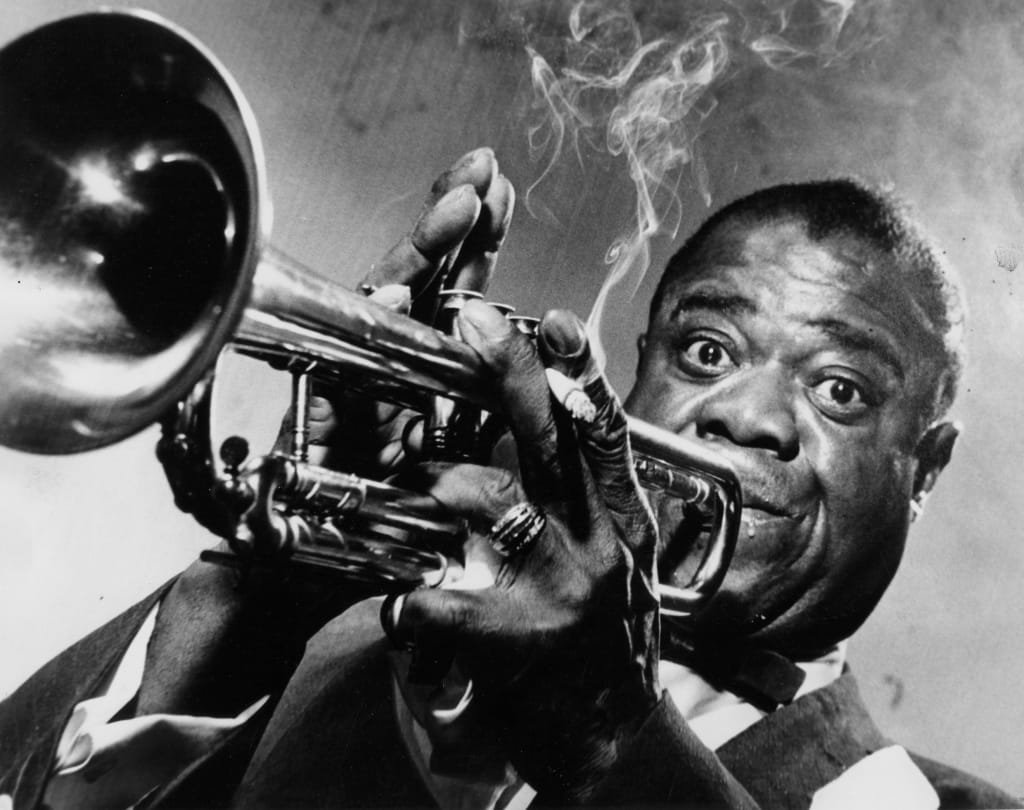Louis Armstrong’s Soundtrack for Cannabis Culture — Black History Month

Louis Armstrong is considered the father of jazz music. His love for cannabis inspired his music exploration and discovery as he transformed the genre from a backtrack for cabarets and speakeasies into art transcending the barriers of race and class.
Armstrong’s cannabis use was about much more than recreation. Many consider him an early advocate and freedom fighter who first went to jail for cannabis in 1931, and had another encounter with law over it in 1954. His activism brought attention to racism, and also unwanted attention from the FBI who opened a secret file on him.
Louis Armstrong and the Hot Five

In the ‘20s, Armstrong was “King of the Vipers,” a huge sub-culture of cannabis-lovers that thrived in the days before cannabis prohibition. Many say that American cannabis culture was born in that era, when jazz music was popularized in rooms filled with cannabis smoke.
Popular songs like “Muggles” and “Song of the Vipers’’ were part a growing sub-genre of cannabis tunes referred to as “Reefer Songs”. You might be familiar with some of the songs, like Cab Calloway’s “Reefer Man,” Fats Waller’s “Reefer Song,” Mezzrow’s “Sendin’ the Vipers,” and Benny Goodman’s “Texas Tea Party”.
“By the time the musicians played, everyone was pleasantly stoned, Louis most of all…. The band may as well have been called Louis Armstrong and His Vipers.”
Armstrong was known to smoke cannabis while he recorded, saying it produced some of his best work. As his career grew, he worked with several groups, including the “Hot Five”. The Hot Five’s mellow sound was attributed to the fact that Armstrong insisted that everyone smoke cannabis before recording. In his Armstrong bio, Laurence Bergreen writes, “By the time the musicians played, everyone was pleasantly stoned, Louis most of all…. The band may as well have been called Louis Armstrong and His Vipers.”

In 1957, Armstrong encountered the direct threat of racism when a white-power group threw explosives at a theater in Tennessee where he was performing. This didn’t deter “Pops”, as he was called by his friends and fans, he declared that he’d keep playing “anywhere they’ll listen.” Weeks later, a major racial incident in Little Rock, Arkansas took place when Governor Orval Faubus used the National Guard, in defiance of a federal court order, to desegregate local schools. Armstrong responded by cancelling an international goodwill tour saying he could not represent the America while the country turned a blind eye to racism. He called out President Eisenhower saying that he was “two-faced” and had “no guts.”
“If you decide to walk into the school with the little colored kids, take me along, Daddy. God bless you.”
When Eisenhower eventually took action, sending federal troops to force the court order and integrate the schools, Armstrong sent him a telegram that read: “If you decide to walk into the school with the little colored kids, take me along, Daddy. God bless you.” The relationship between the musician and the politician eventually thawed enough for Armstrong to receive birthday wishes from Eisenhower.
Rumor has it, the incident in Little Rock was not Armstrong’s first outreach to the President on policy issues. He’d previously written a letter to Eisenhower asking him to legalize cannabis. Pops heard that his buddy Bing Crosby, another cannabis-lover, had gotten a waiver to grow it and wanted the same opportunity. Researchers reviewing Armstrong’s FBI file, the Eisenhower Library and the Louis Armstrong Archives did not locate the letter. One can only imagine that in the time gone by the letter has gone up in smoke.
